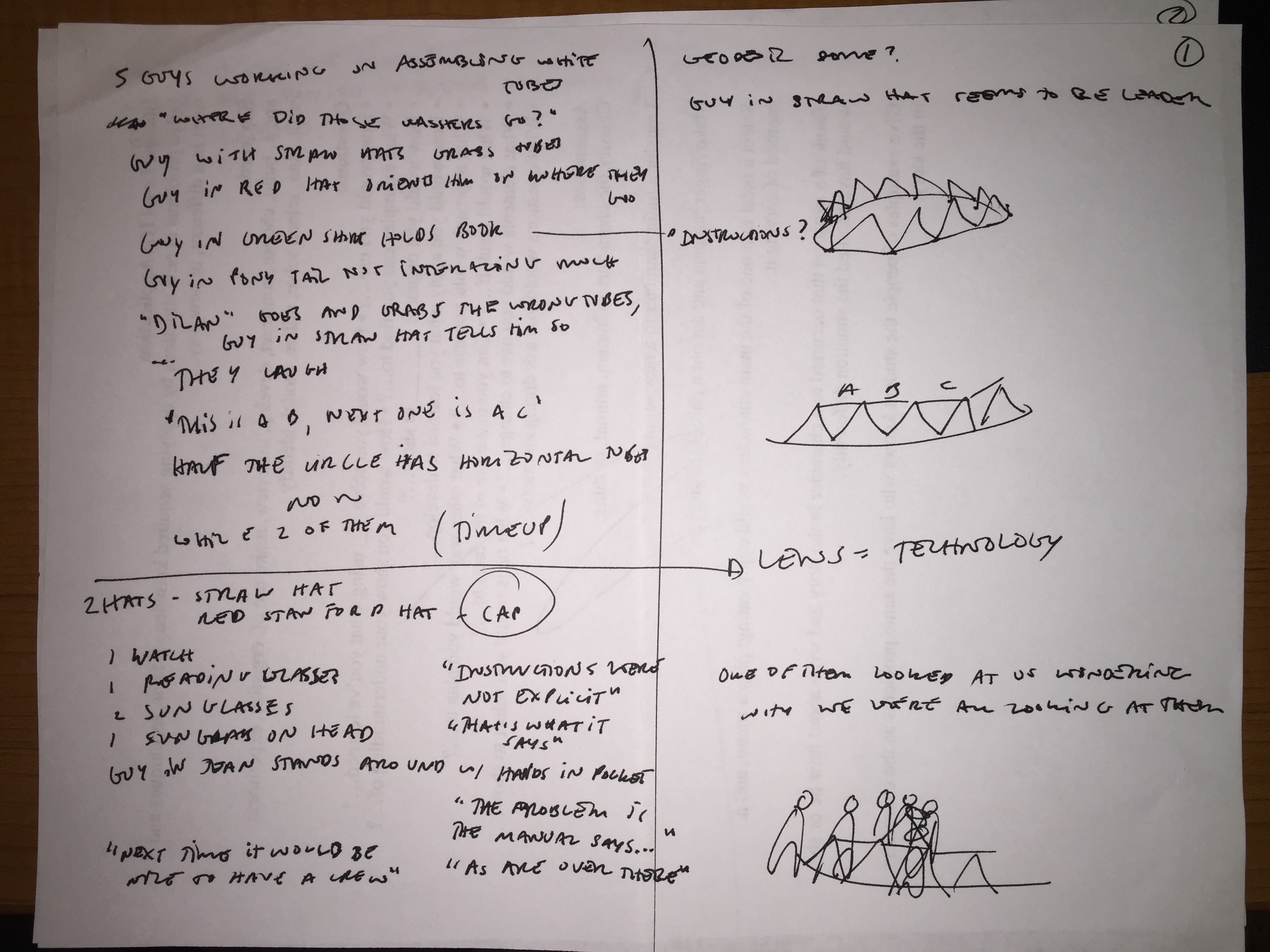This morning went with Soren to Open Mind Schools to start our project for this class with them. Amazing opportunity to work directly with a special kid and hopefully make a difference.
Category Archives: LDT – GSE – Stanford
Tech 4 Learners – Week 4 – Reading Assignment
Assignment
This week, we will discuss Carol Dweck’s (2007) The Perils and Promises of Praise. In 2-3 paragraphs, share your thoughts about what the big idea is, and why it is important. How might this idea impact how you think about the design of a learning technology?
The-Perils-and-Promises-of-Praise-Carol-S-Dweck.pdf
Response:
The big idea of the article is that praise should not be given simply for the sake of praise – it should be more towards constructive criticism rather than simply ‘giving a star’ and saying that the person ‘is’ good/great/intelligent.
Praising a kid for being smart seems to introduce the notion that ability alone leads to performance, and that actually putting in effort or being perseverant has no affect on your status quo. Praising the work a kid put into the homework for example, leads them to value their attempts instead of reinforcing the notion that they are stuck at a certain performance level.
I related this piece with laziness, lethargy and a ‘why bother’ attitude that infects our human nature. If you’re not ‘number one’ why should one even try to get closer if they will only get praise once they get there? To know that you will get no praise or positive reinforcement along the way it truly unsettling, especially if ‘getting there’ seems unachievable at first.
It’s meritocracy in place of ‘judgment day’.
It’s valuing the process and not only the final result.
This is a fundamental concept that if applied correctly, has shown significant immediate results and hopefully provides long-lasting, life changing results.
LX Designers should incorporate this intrinsically in their process and remember that this probably works not only with kids, but of human beings in general, of any age, culture or social status. It talks to our inner most motivation (or lack of) to become a better person, to learn more and to progress in life.
It dispels the notion that your condition is immutable and that you have control over your mind, and therefore your life. It is possible to go from a fixed to a growth mindset.
Powerful 🙂
Day off
Time for some fun. Went out with Matt Walker last night in San Francisco and today came up to Fort Brag to bring Dri 🙂
Stopped at Healdsburg – amazing little town.
Thinking Like a Game Designer Workshop
This Saturday Karin Forssell – LDT’s director organized the “Thinking Like a Game Designer Workshop” at the Institute of Design at Stanford – a.k.a d-school
“A high-energy creative workshop exploring how to think like a game designer. (Yes, you get to play games too!) But wait! You also get to connect with LDTers and friends. At the end we will talk about how these ideas might apply to future projects.”
It was truly interesting – Core Loop – Compulsion Analysis – B-MAT and yes, we played some games and even danced!
LDT Seminar – Week 3
Today we had the pleasure to hearing from 3 more LDTers 🙂
Also had group discussion about are “Learning Problem”… mine was definitely too broad and was more of a “Knowledge Problem”… have to refine it and phrase it better…
Original:
“Alex is a motivated young developer who is fascinated with the new AppleTV OS that recently came out. He learned how to create apps for it and it was quite tricky, even though he has experience with iOS Apps already. He understands this is valuable content he’s acquired and knows that he can make some money out of this (and he needs it). He now has to decide which platform(s) to use to distribute his content. To address this challenge he needs to find out what are the available platforms out there, their market share, revenue sharing business models as well as usability, feature sets and appear. In order to do so he must research the topic online, talk to other users and subject matter expert for some guidelines and pointers.
Noam Gordon x2
Met up with Noam in person finally! We worked together in the past building Dial.Radio – a Firefox OS project – amongst several other design projects.
Went for some beers on Thursday at a local bar where apparently Elon Musk usually goes to. The bar is called “Antonio’s Nut House” – free peanuts guarded by a gorilla – peanut shells MUST be thrown on the ground.
Yesterday we ran into each other again at the park behind my house – he brings his dog every day – it’s one of the few parks that people let there dogs off the leash around here.
He was swinging at some tennis balls against the wall they have there so I joined in a little – hadn’t played tennis for quite a few years – my shoulder felt fine – maybe I should get back into playing again 🙂
Human-Computer Interaction
So… changed from HCI 247 to HCI 547 (studio vs. seminar) It was going to be too much work for the quarter to take 247 but since still wanted to stay in touch with the subject, 547 offers a great alternative.
http://hci.stanford.edu/courses/cs547/
Amazing videos and lecturers – went to the first class today (missed the first two) – and the topic was “Transforming Design: Interaction with Robots and Cars” by Wendy Ju, Stanford University
Tech 4 Learners – Week 3 – Learning Technology Evaluation
Learning Technology Evaluation (LTE) Round 1
Tool Evaluated:
Synopsis
Formative offers teachers the ability to create tests or exercises for a group of learners with an intuitive interface and several question format options including images, video, documents and drawing boards.
As the learners are engaged in the activity, the teacher can watch their progress in real time – you see the students typing, drawing or simply submitting a response.
You can interact with them by sending messages to the learner as well as assigning a grade on a cleverly designed scale: 0 to 10, ‘X’ to ‘Checkmark’ and from red to green – all in one element.
The tool aims at facilitating the process of creating, distributing, taking and grading tests with a simple but feature-full interface.
Learning
The designers clearly believe that tests are an integral part of learning. Their emphasis though seems to be in the notion that learners can improve their learning by receiving “instant feedback” from the teacher. Seemingly rooted on Vygotsky’s ZPD concept, the designers created a tool that facilitates this interaction between the teacher and the learner.
Content
The designers saw the lack of feedback as a barrier in developing an understanding in the subject matter. Learners could benefit from receiving direct feedback while engaged in the activity.
Another barrier was the difficulty in creating interactive and hopefully more interesting tests and exercises that assess the learners progress. With this in mind they created a tool that made it easy for teachers to incorporate multimedia content in their tests and activities. As a result, for the learners, a more interactive and “rich” test or exercise – hopefully more fun?
Technology
Formative’s implementation leverages well the web browser’s HTML 5 advanced capabilities such as cross-platform compatibility, quasi-realtime connections between teacher and learners, drawing boards and single-page app-like interface.
Assessment
- The success of this tool could be measured based on a few criteria:
- Teacher’s level of satisfaction with the tool
- Learner’s experience while taking the tests
- How effective was the “instant feedback” feature
- How much “instant feedback” actually occurred
- Compare test results from learners who used the tool versus those who took the same test on paper.
Evaluation
0 – Absent, 1 – Minimal, 2 – Strong, 3 – Exemplary
The tool is making effective use of unique features of this technology
Rating: 0 1 2 3
The tool uses well the browser’s capabilities for user interactions like drawing and single-page app-like interface. Yet I felt a lot more could have been done with the “instant feedback” feature – allow the teacher not only to write a comment but interact with the submitted material – draw on it or record audio feedback for example.
The features of the tool demonstrate an understanding of the target learner.
Rating: 0 1 2 3
The tool demonstrates the understanding that the learner needs/desires feedback from the teacher when taking a test or doing an exercise. Yet the tool seemed to be more targeted towards the needs of the teacher than that of the learner. The learner might see the tool as just another way of doing a test or exercise. For the teachers the benefits seemed to be much greater.
The design of the tool suggests an understanding of the challenges unique to learning the target content.
Rating: 0 1 2 3
The design suggests a very good understanding of the challenges involved in creating a test and the difficulties involved in grading and providing feedback to learners. The tool provides many options as to what kinds of questions and content to create in a friendly, simple and direct manner. The ability to annotate directly on images and text works well, as does the platform as a whole. The design also tries to addresses the difficulty of coaching, giving feedback and addressing the ZPD for a large number of learners at once.
Qualitative Research – Week 3 – Class Notes
FOMO
“Fear of Missing Out (FOMO) – common feeling amongst students since there are SO many things going on at the same time and you fear you’re going to miss out on something really interesting.”
Fact is, you ARE going to miss out on MOST things simply because you can only watch one thing at a time and there are SEVERAL events happening at any given time…
Yesterday – was not able to see a talk by Elon Musk about future technologies… today I’m not going to be able to see Elisa Villanueva Beard, the CEO of Teach For America talk about her experiences…
Just wish I had more time here!! kkk










